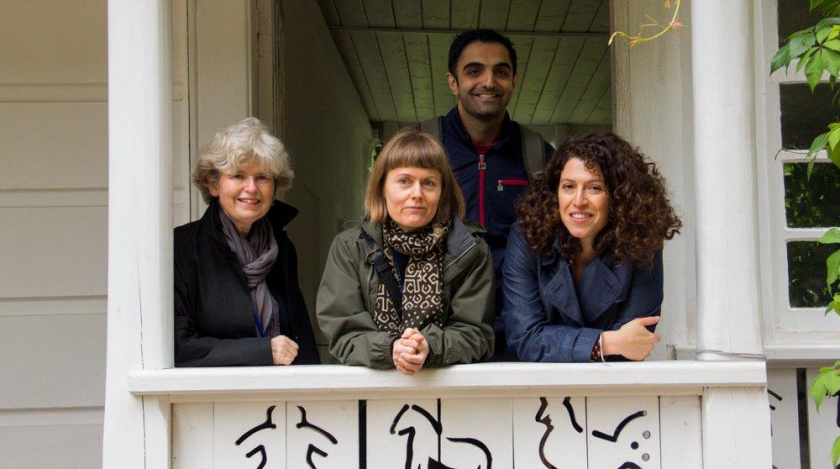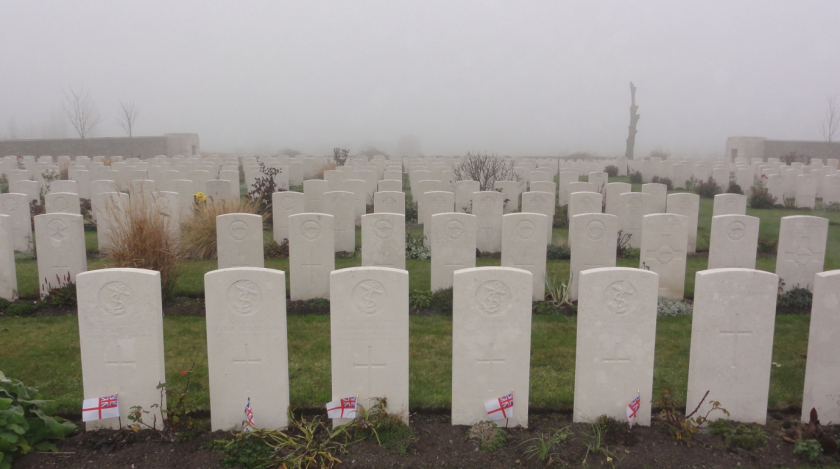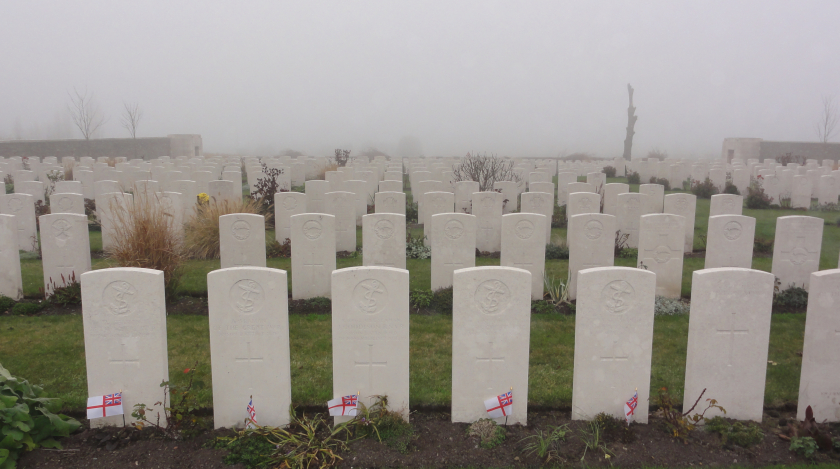
Biography
Owen Sheers was born in Fiji in 1974 and brought up in Abergavenny, South Wales.
He was educated at King Henry VIII comprehensive, Abergavenny and New College, Oxford. The winner of an Eric Gregory Award and the 1999 Vogue Talent Contest for Young Writers, his first collection of poetry, The Blue Book (2000), was shortlisted for the Arts Council of Wales Book of the Year Award and the Forward Poetry Prize for Best First Collection. His debut prose work, The Dust Diaries (2004), a non-fiction narrative set in Zimbabwe, was shortlisted for the Ondaatje Prize and won the 2005 Arts Council of Wales Book of the Year Award.
Sheers has also written for radio, television and newspapers, and has toured extensively. In 2004 he was Writer in Residence at The Wordsworth Trust and was selected as one of the Poetry Book Society’s 20 'Next Generation' Poets. Owen’s second collection of poetry, Skirrid Hill (2005), won a Somerset Maugham Award. Unicorns, almost, his one-man play based on the life and poetry of the World War II poet Keith Douglas, was produced by Old Vic New Voices in 2006, with Joseph Fiennes in the lead role.
In 2007 his play about Alun Lewis was broadcast on BBC Radio 4, and his first novel, Resistance, was published. He later co-wrote the screenplay for the film adaptation, released in 2011. His novella Two Ravens, one of the stories in Seren's 'Mabinogion' series, was published in 2009. That same year, he presented the BBC4 television series A Poet's Guide to Britain, and wrote the accompanying book of the series.
His theatre work includes the short play The Fair and Tender, performed as part of Bush Theatre's 66 Books, and the script and novelisation (as The Gospel of Us) of The Passion, a site-specific 72-hour production by the National Theatre of Wales. Other plays include The Two Worlds of Charlie F. (2012), performed at the Theatre Royal Haymarket and based on the experiences of wounded soldiers; Mametz, a site-specific play about the battle of the Somme; and Pink Mist (2015), a verse drama performed on Radio 4, which later became a touring stage production. He also wrote the libretto for the oratorio The Water Diviner's Tale, performed in 2007 at the Royal Albert Hall for the 2007 BBC Proms.
He was the 2012 Welsh Rugby Union Artist in Residence, and published Calon (2013), a memoir of his year "at the heart of Welsh rugby". His most recent novel is I Saw a Man (2015).
Critical perspective
Owen Sheers has a gift for the epic sweep of narrative and for the lyrical evocation of passing moments.
His work, particularly notable for its energy and sensuality, has focused on the way people identify with land and country. There is also an interest in loss, separation and the many different borders that people create between themselves.
Sheers' first collection of poetry, The Blue Book (2000), examines adolescent memory, personal history, love and togetherness. The best of these poems tell stories, capturing with admirable economy the essence of character and mood. 'Unfinished Business' begins:
'We saw him pass the classroom window,
Bunking off, jumper alive with ferrets,
Two thin dogs snapping round the hem of his coat.'
This feral boy wants ‘Satan’ tattooed on his forehead, but bursts out of the Swansea tattoo parlour before an ‘S’ can be added to the ‘ATAN’. Later he tries to ‘make sense of it in biro,’ scratching in ‘the crucial letter.’ The other kids laugh at his violence:
'though it was always he who provided the punch lines –
usually ten or twenty times before someone could drag him off.'
Elsewhere in The Blue Book, Sheers focuses on the rural and industrial landscapes of South Wales. There are poems on lambing and harvest, on running through rivers and tumbling down scree slopes. We sometimes get the feeling that Sheers is trying things out: a Hughes-like nature poem here, quirky ruminations on lost love there. Space Invaders, which deals with a couple who ‘tense’ as they watch a ‘confidence of swans’ is perhaps a little awkward, but then how does a poet write about these creatures after W.B. Yeats?
Sheers has said that he is drawn to the ‘condensed nature’ of poetry, and the way it can ‘transport someone, intellectually and emotionally, a great distance’. The standout poem in The Blue Book – the one which most conforms to Sheers conception of poetry – is the title poem. It refers to an 1847 Government report on the state of education in Wales. Sheers’ epigraph on the infamous report is taken from the Encyclopaedia of Welsh Literature: ‘the Commissioners reported that the common people were dirty, lazy, ignorant, superstitious, deceitful, promiscuous and immoral, and they blamed all this on Nonconformity and the Welsh language.’ It is impossible for a Welsh poet to ignore issues of cultural identity, home and belonging. The Blue Book is the one poem in the collection which truly tackles this, meditating on the history and future of the Welsh language:
'Because this is how an empire is claimed,
Not just with stakes in stolen land,
But with words grown over palates,
With strength of tongue as well as strength of hand.'
These four lines burn with the force of truth and suppressed pain, they deal with the confusion at the heart of the Welsh experience of itself. Robbed of their native tongue, the majority of people in Wales have been forced to speak in a borrowed language. Sheers reminds us that this is also a feature of colonialism; empire does not simply signify the denial of nationhood, but the denial of language, the very means by which we come to an understanding of ourselves and the wider world. This loss of language is a key to the romantic melancholy, the famous yearning or hiraeth, which underlines the Welsh psyche: there is always that feeling that something is missing. Sheers moves away from the sweep of history to his personal lament at the lack of language. In ‘another blue book / this, my brother’s school book,’ he looks at the Welsh words. The teacher has scrawled ‘Pam nad yw hyn wedi ei orffen?’ across the page. ‘Why is this not finished?’ This is a moment of great resonance. The project to revive the Welsh language is alive and well, but it has left the poet in plaintive cry at a new from of separation:
'...my brother, ten years younger,
but a hundred and fifty years and one tongue apart.'
Skirrid Hill (2005), Sheers’ second collection, is imbued with an even more marked sense of division and divide. ‘Skirrid’ is derived from ‘ysgariad,’ the Welsh for divorce or separation. Sheers interrogates the space between people and lives; he finds the pain and the beauty of loss; the knowledge that in each ending there is the possibility of renewal, in each beginning the many shadows of the past. Border Country sees the poet return to a quarry, a childhood playground when he and a friend had once lost themselves for hours:
'...until that day,
when life put on the breaks
and pitched you, without notice,
through the windscreen of your youth.'
The end of youth, an end brought about a tragedy only hinted at, is subtle, mysterious and overwhelming. There are multiple regrets and disappointments of growing up, and the insistent need of a return to an increasingly abstract, almost primal sense of home.
In ‘Keyways,’ one of the most striking poems in Skirrid Hill, two lovers are in a locksmith’s:
'waiting for a set of your keys to be cut
so I can visit your flat when you’re out
and take back all that’s mine again.'
The simple yet affecting metaphor of lock and key is beautifully sustained throughout the poem. The poet believes that he and his lover:
'were keyed alike. That our combinations matched,
our tumblers aligned precisely to give and roll perfectly
into each other’s empty spaces.'
But he was wrong: one of them ‘made a turn that failed to dock’. And that is why they are here in the locksmith’s, waiting:
'Strange then, that we should do this now,
this cutting of keys, just when we’re changing all the locks.'
Skirrid Hill demonstrates Sheer’s descriptive ability, the sensuousness of his imagery, and his imaginative and emotional conviction. However, it is in non-fiction that his gifts have found their truest expression.
The Dust Diaries (2004) is a sublime achievement; it is at once travel book, memoir, biography and novel. In 1900 Sheers’ great-great uncle, Arthur Shearly Cripps, a poet and Anglican missionary, travelled to Southern Rhodesia (now Zimbabwe) for a two-year secondment. He ended up spending more than half a century in the country. Despite the fact that he was there to spread values alien to the Mashona people, he lived among them, and came to live like them. Crisps was an extraordinary man, eccentric and principled, who ran forty-two miles a day between his parishes and was among the first Europeans to fight for African rights. A born maverick, he believed in a black Christ and refused to give in to the authorities, consistently standing up to them and their attempts to do whatever they liked in the name of Empire. He made such an impression on the people that he is remembered every year during the three-day Cripps Festival, celebrated at his old church, now ruined, where hundreds gather from miles around to sing and dance on his grave. In his attempt to retrace Cripps’ footsteps, Sheers journeyed to a land gripped by fear, terrorised by its own government, suffering from the very same land reform policies which Cripps himself had anticipated. The Dust Diaries is a brave, moving portrait of a singular individual.
Resistance (2007), Sheers’ first novel, is a work of alternative history which imagines the consequences of a German occupation of much of Britain. It is 1944, and following the fall of Russia and the failure of the D-Day landings, the women in the remote valley of Olchon, wake to discover that their men have gone. When the Germans arrive, the all-female community, under siege, begins to transform under the weight of the pressure. While a dependency between the locals and the invaders develops, it is fragile, uneasy and unbalanced. At the heart of this novel is the tense relationship between farmer’s wife Sarah Lewis and Albrecht Wolfram, leading the patrol, which Sheers handles exceptionally well. Resistance, like everything Sheers has written, is a eulogy to the meditative beauty of the landscape and a cry for communal values in a time of ruthless individualism. Sheers' achievement with Resistance is to have written a novel which combines the pace and momentum of a page-turner with a beguiling lyricism, further evidence, if any were needed, that Owen Sheers is a daring and imaginative storyteller.
Garan Holcombe, 2008



